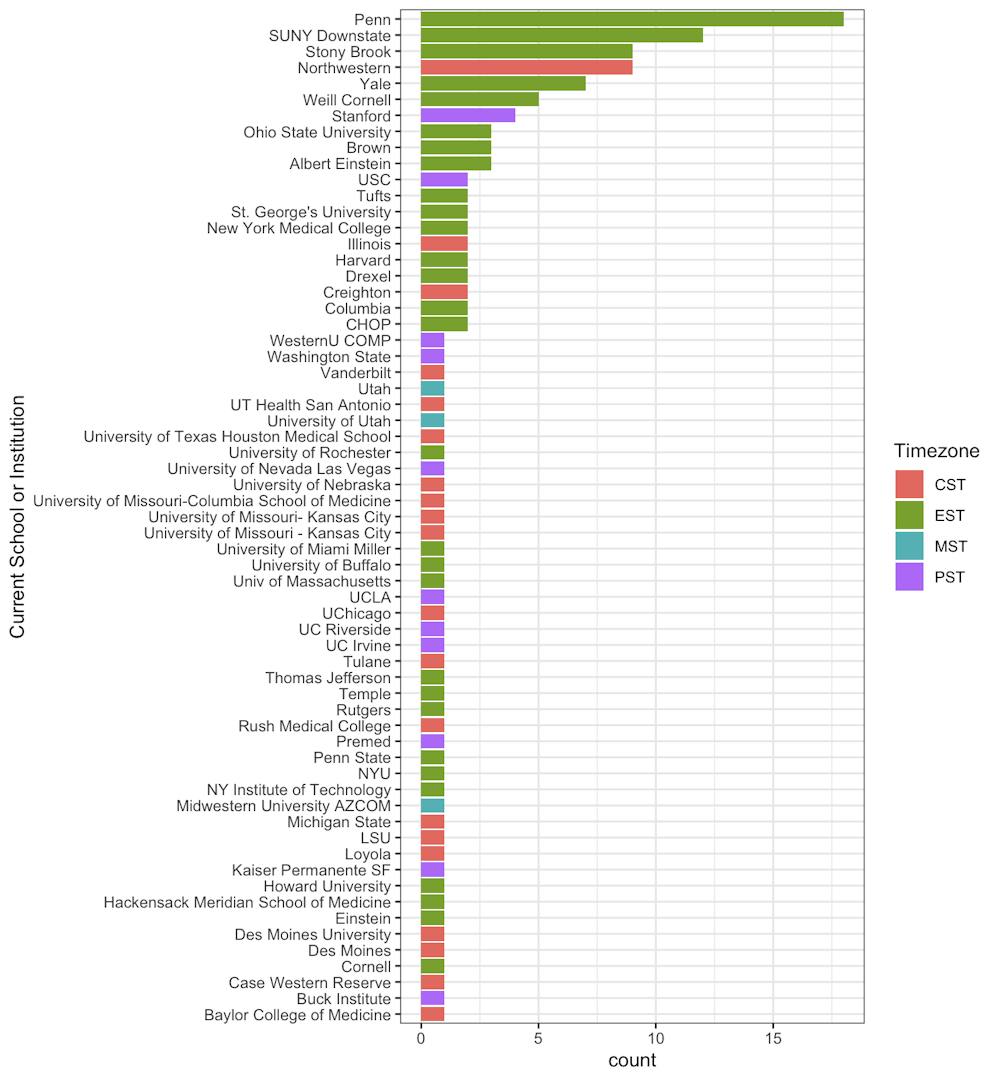
A group of five Perelman School of Medicine students launched a Penn Pals program to connect medical and dental students in the U.S. with those in China, allowing both parties to practice their respective medical Mandarin and English speaking skills.
Medical and dental students in the U.S. communicate once a week for a minimum of 60 minutes, equally split between Mandarin and English, with a student from West China Hospital in Sichuan via Chinese messaging and social media app WeChat, Skype, and other video conferencing platforms. Pairs help each other with medical terms in their respective languages, discuss differences in the Chinese and American health system, and determine medical diagnoses for practice cases in both languages.
“We can help them with their English, and they can help us with our Chinese, and we’ll go through some topics like history [and] how do you talk to patients and figure out their chief complaint and why they are coming in," third-year Penn Med and Genomics and Computational Biology Ph.D. student Jason Xu said.
The scope of the program has surpassed the confines of the Penn community and reached dozens of medical schools across the country. Of the 44 pairs in the program, Xu, who helps run the program, said 16 are Penn students and the rest are affiliated with 18 other U.S. medical schools. 130 medical and dental students from 63 different U.S. medical and dental schools are waiting to be matched with a Chinese medical or dental student as of Nov. 1, he added.
Third-year Penn Med student David Mui, who helped launch the program in September, attributes the program's national reach to his friends attending other medical schools like third-year Yale School of Medicine student Elizabeth Li who helped spread the word about the program.
“I’m surprised by how much interest [Penn Pals] has generated all across the nation, and I think that just continues to emphasize the point that there is a need for medical students to at least be able to communicate in the language that patients are communicating in," Mui said.

A graph representing how many students from each university are enrolled in Penn Pals. (Photo from Jason Xu)
The Penn Pals program serves as a supplement to the ten-week Medical Mandarin elective language course at Penn Med, which teaches the medically relevant Chinese terms and jargon for different organ systems. After winning the Penn Medical Student Government Big Idea Grant in January 2019, third-year Penn Med students David Dai, Carol Wang, Chris Wen, and Mui used the $2,500 grant to establish the Medical Mandarin course at Penn Med.
For the course's second year of instruction, for which it currently has about twenty students enrolled, Mui, Dai, and second-year Penn Med students Cecilia Zhou, Jasmine Sun, and Vincent Huang decided to launch the Penn Pals program in September to supplement the course material. While students are encouraged to take the Medical Mandarin course in conjunction with the Penn Pals program, Mui said the program is open to all Penn medical and dental students.
“As a first year who, because of the pandemic, hasn’t been able to have any patient experience, I see [Penn Pals] as another opportunity to practice communication skills, and it has been helping a lot, because you're being forced to think on two fronts: you’re forced to learn Chinese and make sure you're communicating well with the patient," first-year Penn Med student and Penn Pals participant Tracy Du said.
Xu said Penn Pals conducted the first round of matches on a rolling basis from mid September to early October, giving Penn students priority in the program. Students are matched based on similar medical interests, Du said. Penn Pals expects another two rounds of matches to take place from Nov. 7 to Jan. 15 and Mar. 1 to June 15 to accommodate the growing wait list of students, he said.
First-year Penn Med student Yusha Sun believes the program is a nice extension of the Medical Mandarin course, giving students the opportunity to use the Mandarin medical terms they learn in class with a native Mandarin speaker.
“It provides another layer of potential experience and a way to reinforce what we learned in class," she said. "I think that sort of repetition and improving the ability to communicate in multiple languages is valuable for many people.”
Zhou agreed, adding that medical schools across the country should offer a similar medical Mandarin course to supplement the Penn Pals program that has reached their students.
For Chinese American medical and dental students, Dai said the Penn Pals program will help them communicate with future patients, many of whom may be Chinese. He added that learning medical Mandarin is especially useful for him when helping ill family members who can only describe their symptoms in Mandarin.
Third-year Penn Dental student Byron Hu echoed Dai's sentiments, adding that the program is a way for Chinese American students to combine their interests in medicine and the Chinese language and culture.
“For a lot of Chinese Americans, I think we are very interested in Chinese culture and history. In the medical field, we're especially interested in learning ways to improve how we can deliver care and be a better doctor," he said. "I think Medical Mandarin is a pretty logical way to coalesce all our interests."
The Daily Pennsylvanian is an independent, student-run newspaper. Please consider making a donation to support the coverage that shapes the University. Your generosity ensures a future of strong journalism at Penn.
Donate







